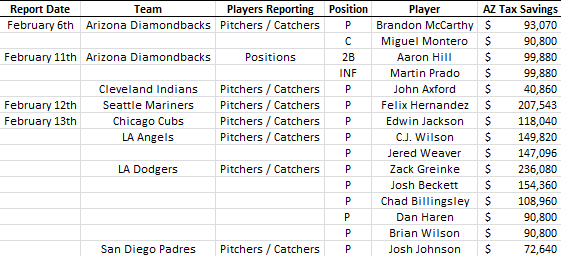
To solve this problem, states have generally adopted what is known as the “duty day” method to calculate how much income athletes earn in their state. This method is calculated as the percentage of duty days spent in the respective state compared to the total duty days that athlete had that season multiplied by the player’s salary.
Arizona defines a duty day as “all days during a taxable year from the beginning of a professional athletic team’s first regular game of the season through the last game in which the team competes.” While calculating duty days from the first regular season game may not seem significant, this small change in calculation saves certain professional athletes millions of dollars.
Why did Arizona adopt this non-traditional approach to duty day calculations when they enacted this rule in 2000? A very brief Arizona sports history lesson - Arizona didn’t get a professional football team until 1988, a professional basketball team in 1968, a professional hockey team until 1996, and a professional baseball team until 1998. However, Arizona has had MLB teams conduct their spring training in Arizona since the Detroit Tigers trained in Phoenix in 1929. In 2000 when this rule was being considered, all 30 teams conducted spring training in only two states - Florida or Arizona. The catch – Florida doesn’t collect income tax at all. Therefore, had Arizona decided to adopt the traditional duty day calculation that most states have adopted they would be collecting 4.5% of every MLB player’s salary during spring training while teams training in Florida would have been playing tax free. Fearful that players and teams would move their spring training locations to Florida (or another state that doesn’t charge income tax e.g. Texas), Arizona valued the economic impact that spring training brings them over the economic impact taxing MLB player’s salaries would bring Arizona.
This is a big win for MLB players because regardless of which team they play for, they are not taxed for state income taxes on at least 20% of their salary each year. Players in other professional sports leagues generally have to pay state income tax on 100% of their income so by Arizona passing this law it costs the state lots of tax revenue but gives MLB players a nice tax savings each year.
Be sure to follow us on Twitter for the next few weeks as we will reveal each day that an MLB team reports for spring training which players benefit most from Arizona’s minor difference in duty day calculation. A few teams have already reported so here is a short list of some big tax savers.
Want more? Sign up to receive TaxaBall Income posts by email, follow on twitter or like us on Facebook.


 RSS Feed
RSS Feed